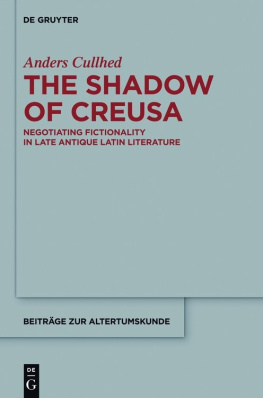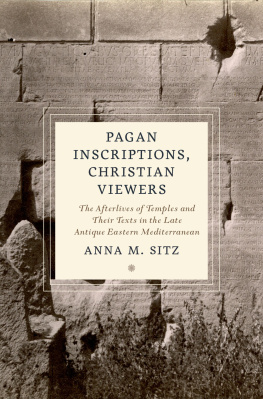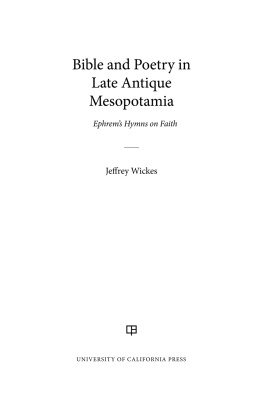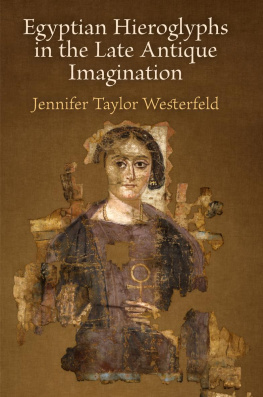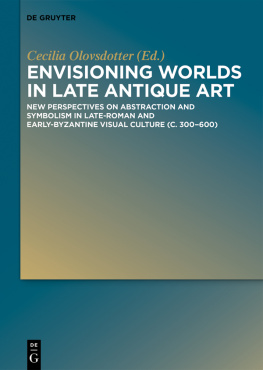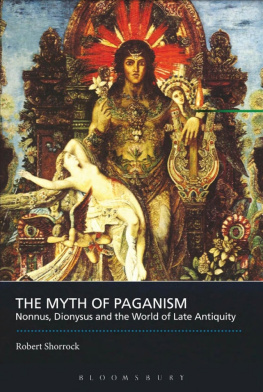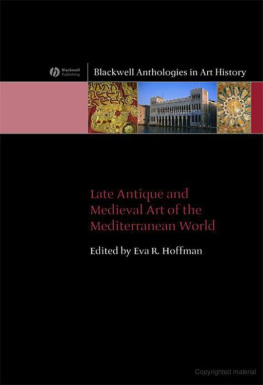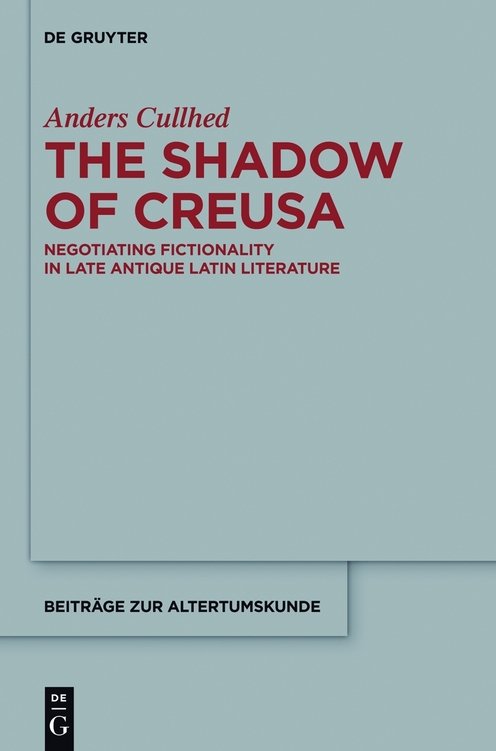Acknowledgements
I thankfully acknowledge the permissions granted by the following authors and publishing firms to reproduce material that originally appeared in their publications:
Arizona Center for Medieval and Renaissance Studies, Tempe, AZ: Avitus, The Poems of Alcimius Ecdicius Avitus, transl. G.W. Shea, Medieval and Renaissance Texts and Studies (172), 1997, pp. 81, 134.
Brepols, Turnhout:
- Arator, Aratoris Subdiaconi Historia apostolica, I, ed. A.P. Orbn, Corpus christianorum, Series latina (130), 2006, pp. 21415, 259, 33940, 349, 36263, 38889, 405.
- Isidore of Seville, Isidorus Hispalensis Sententiae, ed. P. Cazier, Corpus christianorum, Series latina (111), 1998, pp. 23738.
- Maximus of Turin, Maximi episcopi Taurinensis. Collectionem sermonum antiquam nonnullis sermonibus extravagantibus adiectis, ed. Almut Mutzenbecher, Corpus christianorum, Series latina (23), 1962, pp. 14546.
Cambridge University Press, Cambridge: William Shakespeare, The Tragedy of Hamlet, Prince of Denmark, ed. J.D. Wilson, The Works of Shakespeare/The New Shakespeare, 1969, p. 56.
The Catholic University of America Press, Washington, DC: Caesarius of Arles, Sermons, I, transl. M.M. Mueller, The Fathers of the Church (31), 1956, p. 10.
Cerf, Paris: Avitus, Histoire spirituelle, I, ed. and transl. N. Hecquet-Noti, Sources chrtiennes (444), 1999, pp. 194, 196.
Columbia University Press, New York:
- Macrobius, Commentary on the Dream of Scipio, transl. W.H. Stahl, Records of Western Civilization (48), 1990, pp. 85, 86, 218.
- Martianus Capella, Martianus Capella and the Seven Liberal Arts. II. The Marriage of Philology and Mercury, transl. W.H. Stahl, R. Johnson & E.L. Burge, Records of Civilization (84), 1977, pp. 3, 4, 45, 63, 64, 381.
Gallimard, Paris: Jean-Jacques Rousseau, uvres compltes. I. Les confessions. Autres textes autobiographiques, eds. B. Gagnebin & M. Raymond, Bibliothque de la Pliade, 1959, p. 41.
Hackett, Indianapolis, IN: Boethius, Consolation of Philosophy, transl. J.C. Relihan, 2001, pp. 3, 15, 72, 8384, 90, 9293, 12122, 143, 144.
Harvard University Press, The Publishers and the Trustees of the Loeb Classical Library:
- Ausonius: Vol. I, Loeb Classical Library 96, transl. Hugh G. Evelyn White, pp. 242, 243, Cambridge, MA: Harvard U.P., 1919.
- Boethius: The Theological Tractates, transl. H.F. Stewart, E.K. Rand, & E.J. Tester; The Consolation of Philosophy, transl. E.J. Tester, Loeb Classical Library 74, pp. 134, 260, 274, 296, 310, 314, 316, 374, 420, Cambridge, MA: Harvard U.P., Copyright 1973.
- Macrobius: Vol. II, Saturnalia, Books 35, Loeb Classical Library 511, ed. and transl. Robert A. Kaster, pp. 222, 223, 224, 225, Cambridge, MA: Harvard U.P., Copyright 2011.
- Ovid: Vol. I, Heroides. Amores, Loeb Classical Library 41, transl. Grant Showerman, 1914, rev. G.P. Goold, 1977, pp. 502, 503, Cambridge, MA: Harvard U.P., Copyright 1977.
- Ovid: Vol. II, The Art of Love and Other Poems, Loeb Classical Library 232, transl. J.H. Mozley, 1929, rev. G.P. Goold, 1939, pp. 1315, Cambridge, MA: Harvard U.P., Copyright 1979.
- Ovid: Vol. III, Metamorphoses, Books 18, Loeb Classical Library 42, transl. F.J. Miller, 1916, rev. G.P. Goold, 1977, pp. 448, 449, Cambridge, MA: Harvard U.P., 1916, 1921, 1977.
- Prudentius: Vol. I, Loeb Classical Library 387, transl. H.J. Thomson, pp. 10, 11, 20, 21, 50, 51, 76, 77, 190, 191, 192, 193, 194, 195, 210, 211, Cambridge, MA: Harvard U.P., Copyright 1949.
- Prudentius: Vol. II, Loeb Classical Library 398, transl. H.J. Thomson, pp. 8, 9, 10, 11, 142, 143, 230, 231, 328, 329, 372, 373, Cambridge, MA: Harvard U.P., Copyright 1953.
- Quintilian: Vol. III, The Orators Education, Books 68, Loeb Classical Library 126, ed. and transl. Donald A. Russell, pp. 58, 59, 60, 61, 62, 63, Cambridge, MA: Harvard U.P., Copyright 2001.
- Virgil: Vol. I, Eclogues, Georgics, Aeneid IVI, Loeb Classical Library 63, transl. H. Rushton Fairclough, 1916, rev. G.P. Goold, 1935; revised with a new introduction 1999, pp. 48, 368, 370, 550, Cambridge, MA: Harvard U.P., Copyright 1999.
All the above Harvard U.P. copyrights are held by the President and Fellows of Harvard College. Loeb Classical Library is a registered trademark of the President and Fellows of Harvard College.
John Hopkins University Press, Baltimore, MD: Joel C. Relihan, Ancient Menippean Satire, 1993, pp. 20910. 1993 The Johns Hopkins University Press.
Liverpool University Press, Liverpool:
- Avitus of Vienne, Letters and Selected Prose, transl. D. Shanzer & I. Wood, Translated Texts for Historians (38), 2002, p. 261.
- Lactantius, Divine Institutes, transl. A. Bowen & P. Garnsey, Translated Texts for Historians (40), 2003, pp. 82, 151, 43536.
New City Press, New York:
- Augustine, The Confessions, transl. M. Boulding, The Works of Saint Augustine, a Translation for the 21st Century (1.1), 1997, pp. 5354, 8283, 22728, 22829.
- Augustine, Letters, IIV, eds. J.E. Rotelle & B. Ramsey, transl. R.J. Teske, The Works of Saint Augustine, a Translation for the 21st Century (2.14), 200105, vol. I, pp. 28, 174, 22223, vol. II, p. 18.
Norton, New York: Lucretius, The Nature of Things, transl. F.O. Copley, 1977, p. 23.
Ohio State University Press, Columbus, OH: Fulgentius, Fulgentius the Mythographer, transl. L.G. Whitbread, 1971, pp. 7273.
Oxford University Press, Oxford:
- Augustine, De doctrina Christiana, ed. and transl. R.P.H. Green, Oxford Early Christian Texts, 1996, p. 125.
- Virgil, Aeneid, transl. Frederick Ahl, 2007, pp. 53, 136. Paulist Press, Mahwah, NJ:
- Augustine, Against the Academics, transl. J.J. OMeara, Ancient Christian Writers (12), 1950, p. 112.
- Augustine, The Greatness of the Soul. The Teacher, transl. J.M. Colleran, Ancient Christian Writers (9), 1950, pp. 100 01.
- Maximus of Turin, The Sermons of St. Maximus of Turin, transl. B. Ramsey, Ancient Christian Writers (50), 1989, pp. 9091.
- Paulinus of Nola, Letters of St. Paulinus of Nola, III, transl. P.G. Walsh, Ancient Christian Writers (35), 1966 67, vol. I, pp. 157 59, 162, vol. II, pp. 33, 267.
- Paulinus of Nola, The Poems of St. Paulinus of Nola, transl. P.G. Walsh, Ancient Christian Writers (40), 1975, pp. 5859, 61, 83, 15859, 20203.
Penguin, London: Augustine, Concerning the City of God against the Pagans, transl. H. Bettenson, Penguin Classics, 1984, pp. 386, 868.
Pontifical Institute of Mediaeval Studies, Toronto: Avitus, The Fall of Man. De spiritalis historiae gestis libri IIII, ed. D.J. Nodes, Toronto Medieval Latin Texts (16), 1985, p. 16.
Random House, New York: Dante Alighieri, Paradiso, transl. R. & J. Hollander, 2008, pp. 3, 239.
Scholars Press, Atlanta, GA:
- Arator, Arators On the Acts of the Apostles (De actibus apostolorum), transl. R.J. Schrader, with J.L. Roberts III & J.F. Makowski, Classics in Religious Studies (6), 1987, pp. 22, 38, 7273, 76, 80 81, 8990, 102.
- Augustine, Augustine on Romans. Propositions from the Epistle to the Romans. Unfinished Commentary on the Epistle to the Romans, ed. and transl. P. Fredriksen Landes, Society of Biblical Literature: Texts and Translations (23), Early Christian Literature Series (6), 1982, pp. 5455.
Society of Biblical Literature, Atlanta, GA: Sedulius, The Paschal Song and Hymns, transl. C.P.E. Springer, Writings from the Greco-Roman World (35), 2013, pp. 3, 5, 7, 149, 213, 215.
St. Augustines Press, South Bend, IN: Augustine, On Order [De Ordine], transl. S. Borruso, 2007, pp. 13, 15, 29, 33, 103, 105.

